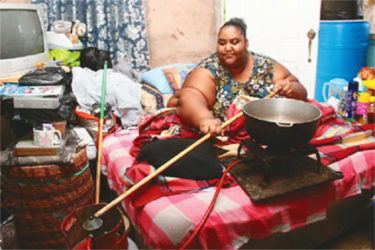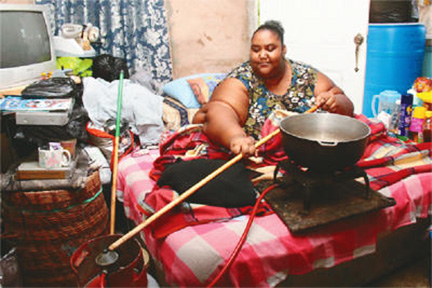(Trinidad Guardian) Weighing 600 pounds, Marissa Nelson has been confined to her bed for the past four years.
On Monday, the 32-year-old woman broke down in tears as she pleaded with Government to intervene and provide specialist medical care, urgent medication and a 24-hour caregiver. “Please, someone, help me before it’s too late,” Nelson said during an interview at her one-bedroom Johnson Street, Valencia, home.
Nine years ago, Nelson lived a normal and healthy life. She was married but the relationship soured and she divorced in 2005.
Nelson said she had everything going for her working as a geriatric nurse, a job she loved, taking care of the elderly.
In a strange twist of fate, Nelson now has no one to attend to her needs. She lives alone and depends on the generosity of her neighbours and her 68-year-old mother, Sylvia, who is an amputee. Her mother’s leg was amputated due to complications from diabetes.

Before she became ill, Nelson got married at 18. The marriage to her childhood sweetheart lasted five years before she got a divorce. “Then suddenly in 2008, I fell ill with pneumonia and was unable to breathe,” she said.
Doctors then diagnosed Nelson with lymphoedema after doing a series of tests at the Sangre Grande Hospital. She was prescribed medication which had powerful steroids and within a short space of time Nelson started to pack on the pounds.
“I was 175 pounds before I got sick. Then the weight started piling up on me.” By 2012, Nelson lost mobility in both legs, which are now covered in mammoth growths. These growths, the size of basketballs, sometimes erupt and ooze fluids.
“The doctors told me there is no cure,” Nelson said. Though the upper part of Nelson’s body is normal, below her waist looks abnormal and weird with her enormously swollen feet. “When I walk, the growths used to collide with each other. It was a very painful experience. For the last four years I have been bedridden…a prisoner in this bed. It’s not a nice way to live. I have to do everything here…bathe and relieve myself in my pampers.”
To keep herself active, Nelson cooks her meals from her bed using a one-burner stove perched on a small table. She uses the handle of a broom to reach for anything she needs.
“I know it’s dangerous but I don’t have a choice. I can’t get up. Also, I don’t depend on my mother, who is an amputee, to do everything for me. I like to be independent. I am afraid if my mother dies today or tomorrow, what will become of me? I will suffer in this house and die because I have no one but her to help me.”
Nelson said her mother changes her bedliners and cleans her ulcers every day.
“I am grateful to my mother. She helps however she can. But she can’t do much since she is in a wheelchair.”
She said attempts were made in 2013 under the former People’s Partnership government to have the growths removed, but after spending a month at the San Fernando General Hospital her blood count dropped too low and she was discharged.
Nelson was also promised by former Minister of the People Glenn Ramadharsingh to be sent to Cuba to have gastric bypass surgery, but that too did not materialise.
“No one contacted me…no follow-up calls were made and it was just left there,” she said.
Ramadharsingh said last night Nelson’s case was “very complicated and complex” and he had instructed his technocrats to try their best to help the woman.
He said after he left office in 2014 he was unaware of the progress of the case.
In February, Nelson said she had to call the T&T Fire Service and T&T Defence Force who had to lift her bed, with her on it, and place it in the tray of a Regiment truck to take her for medical attention when she was suffering from a bout of pneumonia.
Although she receives $1,800 monthly disability grant and is a recipient of a $410 monthly food card, Nelson said the money was not enough to buy her pampers, bedliners, antiseptic soaps, 25 packs of baby wipes, bandages and gauze, which total about $5,000 monthly.
“Sometimes I would raise funds by holding a barbeque. The people in the community would buy the tickets to help out. It is really hard to purchase all these things and I don’t have the money. Many times I do without.”
Brimming with emotion, Nelson said she desperately needed the help of a caregiver and medical personnel.
“I didn’t call this upon myself. It happened. If I get a caregiver that would definitely help.”
In 2014, she applied for a caregiver but was blanked.
“I was told that I was too young and the caregivers do not look after the disabled, but the elderly.”
Nelson’s case was highlighted twice by CNC3 in the last three years but help has been slow to come.

